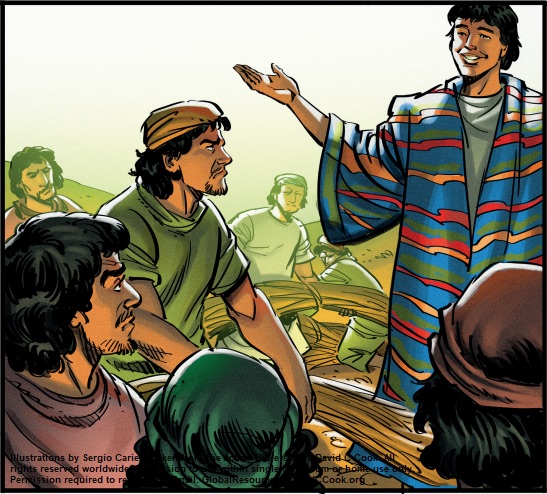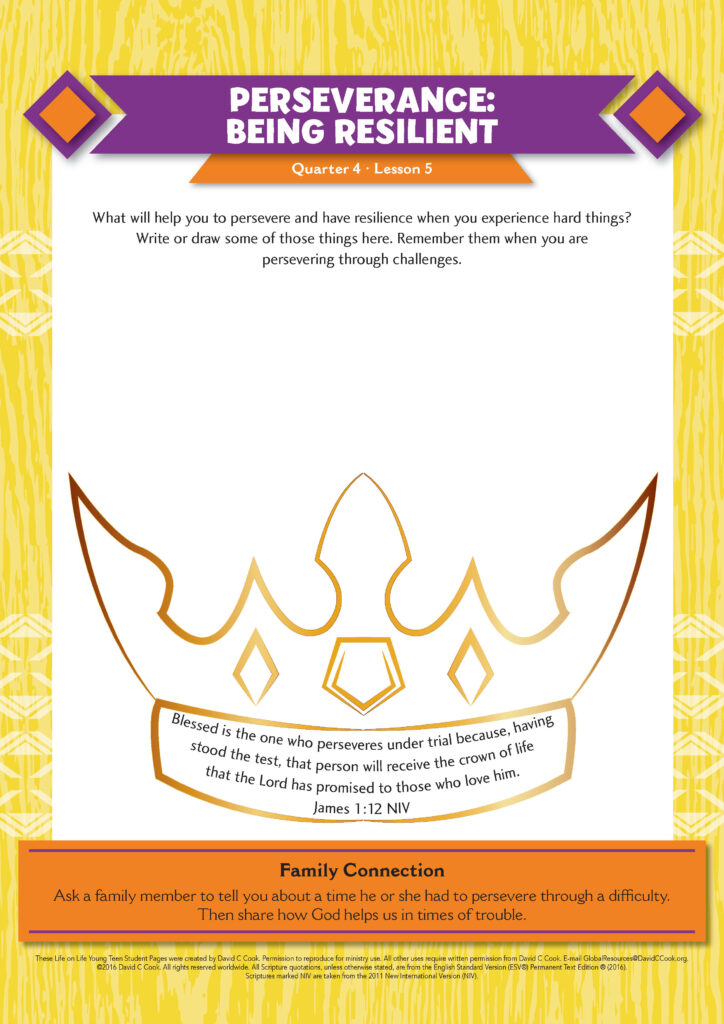During the lesson, the information for you to know is written in regular type, and what we suggest speaking or reading aloud to children is in bold. All resources for this lesson, including the Teacher Guide, Student Page, Family Connection Card, and other resources can be downloaded in a ZIP file by clicking on the following link:
In some lessons you will find "resource articles." These are articles written by experts from around the world to help equip you for your work with children and adolescents. Share them with parents or guardians if you consider it appropriate.
Not only so, but we also glory in our sufferings, because we know that suffering produces perseverance; perseverance, character; and character, hope. And hope does not put us to shame, because God’s love has been poured out into our hearts through the Holy Spirit, who has been given to us.
Romans 5:3–5
Have you ever swum across a lake or river? As you leave the shore, you may be excited. But as you begin to tire, it is more difficult to keep your head above the water. You may feel impatient or frightened. Suffering is similar. When we struggle through challenges, at first we may be full of energy and hope. But as we tire, despair and disappointment may take over. Our challenges may threaten to overwhelm us.
Think of a time you felt like you were drowning in despair or difficulty. What helped you to keep going? Such struggle calls for perseverance and hope. These verses tell us that suffering will produce endurance, which produces character, which produces hope—a hope that does not disappoint. The Bible does not promise we will never experience difficulty. But it does promise that God will give us the strength to get through it. As we go through the deep waters of suffering, we can rejoice in the hope that there is One who will always be with us. Jesus will use our suffering to produce hope. Spend a few minutes praying about any suffering you are going through. Then pray for the suffering you may be aware of that your students are facing. Pray for God’s hope to be birthed in your hearts.
Encourage the students to ask their family members to share about times they had to persevere through a difficulty. The students can then share how God helps us in times of trouble.
Teacher Tip: If possible, email or text the Family Connection Card to the families of your students.
Before class cut or tear apart the cards at the end of the lesson. If you have more students than cards, you can make copies so that each student has a copy. If you cannot make copies, have several students share the same response card.
Welcome your students to class, and tell them that they will do an activity about how to respond to difficult circumstances. Hand out a response card to each student. Explain that they will keep the same response cards for the entire game. Designate 2 sides of your meeting space as helpful or not helpful. Tell the students that you will read a situation, and they will move to the side of the room that they think fits their response for that situation: helpful or not helpful. Explain that some of the responses may not seem to fit the situation at all. If this is the case, the students holding these responses should move to the area for unhelpful responses.
Use the following situations, or think of some that would better fit your students.
After the activity, clap for the students and ask them to take a seat.
All these situations had some level of difficulty to face. As we saw in our activity, some ways we respond can be helpful. Other responses can actually be harmful. When we encounter difficulties in life, we can choose how to respond. If we persevere with healthy choices, we can overcome the situation or grow stronger and continue to have hope. It is important that we do not let the difficulties we encounter in life overwhelm us. With God’s help we can keep going. We can persevere. Listen to what God tells us about perseverance in the Bible.
Have a student read James 1:2–4 aloud from the Bible.
Consider it pure joy, my brothers, whenever you face trials of many kinds, because you know that the testing of your faith develops perseverance. Perseverance must finish its work so that you may be mature and complete, not lacking anything.
James 1:2–4
A trial is a difficulty in life. The Bible tells us a lot about perseverance in times of trial. There were many people in the Bible who were persecuted and mistreated. Some of them did not do what they should have done. Some gave up completely or compromised their values. But others faced their problems with resilience, practiced patience, held on to hope, and stood firm in their values. Today we will talk about a person in the Bible who did all of these things, which helped him to persevere with resilience in the face of great difficulty and discouragement.
Assign students to the roles below. The groups of the brothers, traders, and Pharaoh’s magicians can
be comprised of as many teens as you like. Encourage actors to sit in the audience when they are not participating. The names of the actors are in capital letters the first time they appear in the scene, so that you can say the names loudly to alert the actors to play their roles. Here are the actors you will need:
Explain that you will read scenes from Joseph’s life. The actors will create a frozen picture of each scene when you finish reading it. They should show the actions or emotions of their character and freeze in those positions for about 30 seconds. The actors will be silent, but Joseph will repeat 1 line at the end of each scene: “I will persevere.”
Show the images of Joseph from The Action Bible at the appropriate parts of the story.



You may remember some of Joseph’s story. We have talked about him before, but now we will learn more. He lived a life of perseverance and faith in God. As we act out the Joseph’s story, look for ways that he showed resilience. Remember that “resilience” means adapting to or bouncing back from difficulties such as health problems, trauma, accidents, or other painful experiences. It is overcoming instead of letting those difficulties defeat you. Let’s see what happens.
Review the main points of Joseph’s perseverance with the teens.
Even when he was an outcast of his family, Joseph remembered his value and persevered in his trials. Even when his bad situation continued for years, Joseph did not give up on his own life. Even when he had an opportunity to get revenge on those who had mistreated him, Joseph did not compromise his beliefs. Joseph faced his problems with resilience, practiced patience, remained hopeful, and stood firm in his values.
Persevering is about taking little steps every day. It is about making progress—even it if is small. It is about being resilient to help you to endure and remain hopeful even during a difficult situation.
Students may answer that he was able to gain favour with Potiphar and the prison warden, he was able to use his dream-interpretation skills to become Pharaoh’s second-in-command, and he did not compromise his values.
Remember the verse we read about perseverance earlier? Let’s read it again.
Consider it pure joy, my brothers and sisters, whenever you face trials of many kinds, because you know that the testing of your faith produces perseverance. Let perseverance finish its work so that you may be mature and complete, not lacking anything.
James 1:2–4
The students may answer that perseverance has benefits or that we can grow and learn from persevering through difficult situations.
Show the Memory Verse poster, if you are using it.
Blessed is the one who perseveres under trial because, having stood the test, that person will receive the crown of life that the Lord has promised to those who love him.
James 1:12

Students may answer that those who are steadfast will receive the crown of life, which has been promised to those who love God.
Guide students to understand that the crown of life is like a wreath given to athletes who win their competitions. The crown does not promise glory or honour on earth. Instead, it promises the reward of eternal life with God.
Invite all the teens to stand.
As we remember the scenes Joseph’s story, we will consider some of the difficulties he faced. Think of similar situations in your own life—and consider how you can persevere and be resilient.
Maybe you feel you are an outcast in some area of life. You may be disrespected or hated, or you may feel lonely or misunderstood. But God loves you and is with you. Think about how you can face your problems and persevere with resilience in this situation. Then quietly say to yourself, “I will persevere.”
Maybe something bad has happened to you, such as an injury or illness. Maybe you are homeless. Maybe someone has betrayed you. Remember there is someone you can always trust—God. He will never leave you to face your difficulties alone. Think about how you can practice resilience and persevere in this situation. Then quietly say to yourself, “I will persevere.”
Maybe you have been in a difficult situation for a long time—even years. Perhaps you are abused or live in poverty and are hungry. You might feel forgotten or overlooked. But you are not alone or forgotten—God has a wonderful plan for your life. Think about how you can hold on to hope and persevere in this situation. Then quietly say to yourself, “I will persevere.”
Maybe you face a moral dilemma, or you are wishing for revenge. Maybe you have thought about doing something illegal to make your situation better. Perhaps you are struggling against a bad habit in your life. You do not have to give up. God will give you strength to face your temptations and struggles. Think about how you can stay true to your values and persevere in this situation. Then quietly say to yourself, “I will persevere.”
When you persevere with resilience, you continue to move forward even if your progress is slight. As you encounter challenges in life, you can choose to face your problems with resilience, practice patience, hold on to hope, and stand firm in your values. Trust in God for strength. With His help, you can persevere through even the most difficult times.
Optional: If you are using the Student Pages, the teens can write their thoughts on these pages.

Close with a blessing over your students based on 2 Timothy 1:7.
Blessing: As you persevere through trials, may God give you a spirit not of timidity but of power, love, and self-control. May you see His goodness even in the times of greatest difficulty. And may you feel His love and peace as you persevere.
Lead the teens in singing this quarter’s song if possible.
Life on Life ©2020 David C Cook. Reproducible for home or classroom use only. All other uses require written permission from David C Cook [email protected]. All rights reserved.